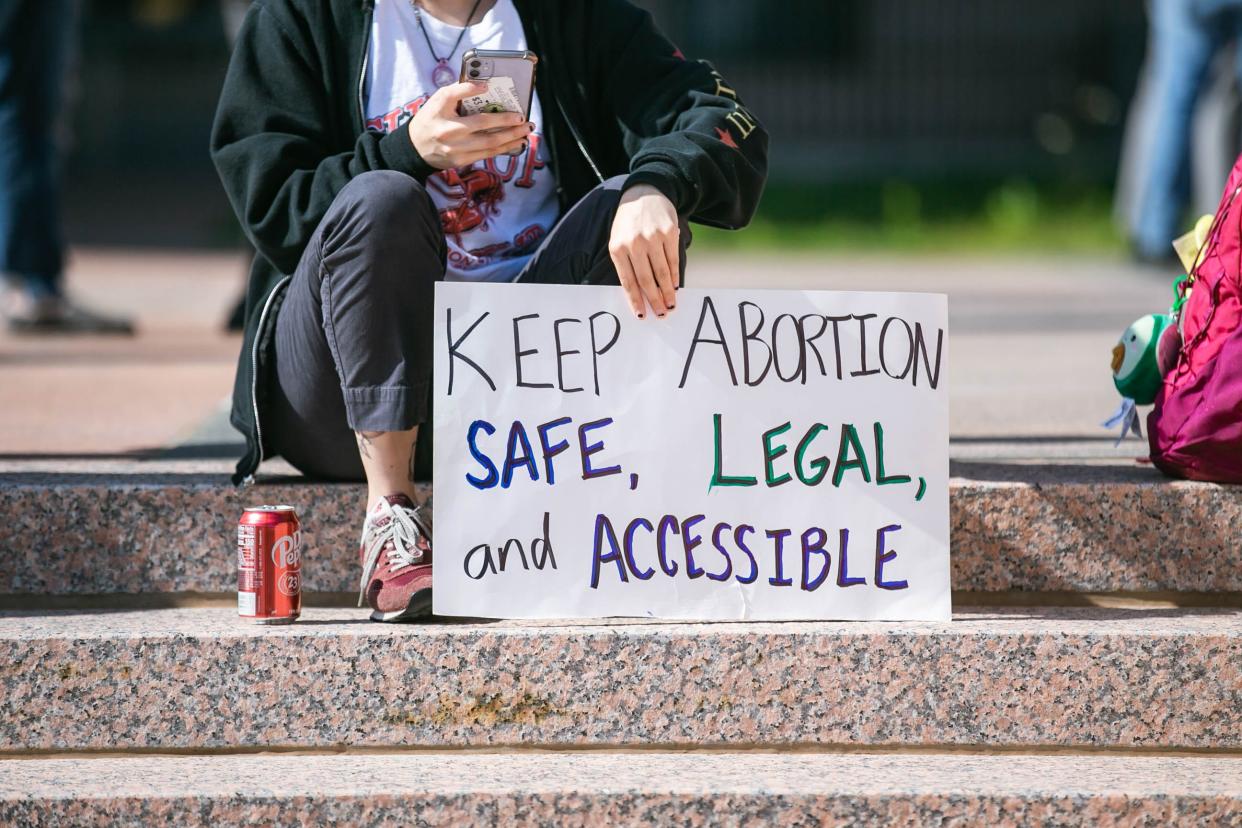Oklahoma Supreme Court halts anti-abortion laws challenged by women's rights groups

The Oklahoma Supreme Court on Tuesday temporarily put a halt to three anti-abortion laws that were passed in 2021 and ordered a district court to rehear the case that challenged them.
The case, initially filed in Oklahoma County District Court by several groups, including the Tulsa Women’s Reproductive Clinic, Planned Parenthood and the Center for Reproductive Rights, sought to overturn five anti-abortion bills passed in 2021.
The plaintiffs challenged the bills, which were set to go into effect on Nov. 21, 2021, saying all five violated the due process clause of the Oklahoma Constitution.
In October 2021, the district court granted a temporary injunction on two of the five bills, but denied a temporary injunction on the other three, House Bill 1904 and Senate Bills 778, and 779. Tuesday, the state’s high court ruled 5-4 to grant the temporary injunction on the three laws that went into effect.
Oklahoma Supreme Court uses Dobbs analysis in abortion case
Justices Douglas Combs, Yvonne Kauger, Noma Gurich, James Edmondson and James Winchester were the majority. Justices John Kane, Dustin Rowe, Dana Kuehn and Chief Justice Richard Darby dissented.
“We have determined that if this court were to adopt the Dobbs analysis (the decision by the U.S. Supreme Court that overturned the right to terminate a pregnancy) we would have to find a limited right to terminate a pregnancy was deeply rooted in Oklahoma’s history and tradition,” Associate Justice Douglas Combs wrote in the majority's opinion. “Since the days of Oklahoma Territory and until Roe (the Roe v. Wade decision) Oklahoma outlawed abortion; however, such criminal statutes provided a limited exception to allow an abortion if was ‘necessary to preserve her life.’”
Combs wrote the clear weight of the evidence showed the three remaining pieces of legislation would “place unnecessary burdens on the lawful termination of a pregnancy and therefore we hold that the trial court erred in not granting the temporary injunction.”
The court's decision was praised by Rabia Muqaddam, senior staff attorney at the Center for Reproductive Rights.
More: Ohio voted to establish abortion rights in the state constitution. Could Oklahoma do the same?
“We are grateful that the Oklahoma Supreme Court recognized how these laws are medically baseless and threaten grave harm, while ensuring that they remain blocked as this case proceeds," Muqaddam said in an emailed statement to The Oklahoman. "This is welcome news, but the devastating reality is that Oklahomans still do not have access to the abortion care they need. The right to abortion is a human right, and Oklahomans deserve to access such essential healthcare without barriers.”
In her dissent, Justice Kuehn wrote she could not find language in the Oklahoma Constitution that supports a limited right to terminate a pregnancy. “I believe the creation to any right to abortion should be done by the people of Oklahoma through initiative petition or through their elected representatives.”
The court’s majority, Kuehn wrote, framed the decision on a temporary injunction without deciding the underlying constitutional claim. “It is impossible to say the bills are unconstitutional for injunctive purposes yet pretend that they may not be unconstitutional for every purpose,” she wrote. “I would remand this case to the district court and allow the parties and that court to address these claims in light of the current law.”
The district court could then, Kuehn wrote, decide to issue a temporary injunction or not based on relevant evidence and argument.
How Oklahoma lawmakers have responded to the ruling
The court's ruling also generated comments from state lawmakers. State Sen. Julie Daniels, R-Bartlesville, called the decision "nonsensical," adding that the court's ruling was "yet another abrogation of its duty to uphold the Oklahoma Constitution."
House Democratic Leader Cindy Munson, however, praised the ruling. "I am pleased to hear the Oklahoma Supreme Court's decision on HB1904, SB778, and SB779. When these extreme anti-abortion policies were presented to us by the Republican supermajority, House Democrats repeatedly raised our concerns regarding constitutionality and the harmful impact they would have on women's health care," Munson said in a statement to The Oklahoman. "Oklahoma consistently ranks among the states with the worst rates of maternal deaths in the United States with our rate being 47.5 maternal deaths per 100,000 live births, above the national average of 33 maternal deaths per 100,000. And to make matters worse, out of 77 counties in Oklahoma, 61 have limited or no access to maternity care. These are the issues we should be addressing, and hopefully with the Court's decision today, we finally will. It is a good day for women's health care and our medical community."
More: Oklahoma mother forced to travel 600 miles for life-saving care due to confusing abortion laws
In March, the state Supreme Court said the state's constitution included the right to end a pregnancy "at any point" if a physician believes the continuation of a pregnancy would endanger the woman's life. The court said a woman does not have to be near death for the pregnancy to be terminated.
Abortion remains illegal in Oklahoma under a 1910 law that punishes a person with 2-5 years in prison for administering or advising a person to end a pregnancy at any point unless it is "necessary to preserve her life."
This article originally appeared on Oklahoman: Oklahoma Supreme Court puts three abortion laws on hold

